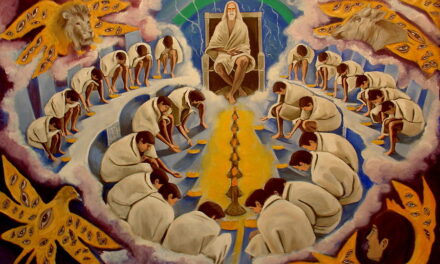The Gospel story of Jesus’ 40 days in the desert is our foundation for Lent. The Spirit leads him there to prepare for his public ministry and he encounters a reality all humanity struggles with: not just temptation, but the tensional movements of the good and evil spirits. Jesus finds himself at one of his weakest points, having fasted for 40 days he is weak and hungry. It’s a situation the evil spirit takes advantage of. Ignatius says that the enemy attacks at our weakest points. Jesus’ guard is down and so the evil spirit, personified as Satan, swoops in.
This story, and its three temptations, reveal for us the three tactics of the evil spirit Ignatius names in his Two Standards meditation and the opposing tactics of God.
 Riches vs Poverty
Riches vs Poverty
The tempter approached and said to him, “If you are the Son of God, command that these stones become loaves of bread.”
He said in reply, “It is written: One does not live on bread alone, but on every word that comes forth from the mouth of God.”
Here, the evil spirit tempts Jesus with riches, or things that can take the place of God. Jesus certainly has the power to turn stones into bread, to use his power to satisfy not just his hunger but the demands of the evil one. He later encountered demands for a miracle in Matthew 16 when the Pharisees asked him for “a sign from heaven”. They’re missing the point – the goodness of God right before their eyes. Riches may be money or things, but they can become idols we rely on so much that we stop relying on God.
The opposing tactic of Jesus is poverty. Whether material or spiritual, poverty means we rely on God. Our use of things, according to Ignatius, should only be for the sake of our growing in relationship with God and we should dispose of them if they don’t help us grow toward God and neighbour. It’s no surprise that poverty is one of the three vows religious women and men make. It’s a statement of reliance on God, not fleeting things.
 Honour vs Lowliness
Honour vs Lowliness
Then the devil took him to the holy city, and made him stand on the parapet of the temple, and said to him, “If you are the Son of God, throw yourself down. For it is written: He will command his angels concerning you and with their hands they will support you, lest you dash your foot against a stone.”
Jesus answered him, “Again it is written, You shall not put the Lord, your God, to the test.”
Honour is all about saying look at me. Jesus could have done as the devil commanded and had angels catch him. He could have made a great show of his power. Throughout Jesus’ public ministry he had the chance to show off and put himself on a pedestal, yet time and time again (especially in the Gospel of Mark) Jesus tells people that he has healed to go and tell no one. Jesus is not about attention or being important. He is one with God, trusts that, and tries to go about his ministry quietly.
Jesus’ opposing tactic to honour is lowliness. He is always redirecting attention from himself to others, to the outcast, to the lowly. Why? Because there’s wisdom to be found in those people and places. It’s paradoxical, but God typically shows up in the hidden places the larger culture least expects: in the poor, the wounded, the sinner.
 Pride vs Humility
Pride vs Humility
Then the devil took him up to a very high mountain, and showed him all the kingdoms of the world in their magnificence, and he said to him, “All these I shall give to you, if you will prostrate yourself and worship me.”
At this, Jesus said to him, “Get away, Satan! It is written: The Lord, your God, shall you worship and him alone shall you serve.”
Here, Satan shows Jesus God’s own magnificent creation and offers it to him if he worships him. Jesus already shares in his Father’s creation, but Jesus is not about to worship creation instead of the Creator. Pride is all about the self. When we worship something that is not God we’re basically worshipping ourselves. This kind of pride can creep into our lives slowly and subtly at first, where it can be disguised as good. Ignatius calls this a “false angel of light”. Pride and honour often go hand in hand. “Look at me and see all the good I’m doing. Look what I’ve achieved.”
Jesus’ opposing tactic is humility. This is not a false humility where you put yourself down or beat yourself up. Jesus’ kind of humility simply points to what is essential to the people he encounters: their healing, their belovedness, their dignity. He doesn’t point to himself. Humility recognises that owning grand kingdoms and having fancy titles are not essential to the work of building God’s kingdom.
These three sets of opposing tactics set the scene for the Two Standards meditation, where our purpose is not so much to choose between “the world” and Jesus, but to recommit to the way of Jesus. Riches, honour, and pride lead to death and destruction. Poverty, lowliness, and humility, on the other hand, are life-giving tactics that bring us the peace and joy we find in God.
This Lent, reflect on how these three sets of tactics play out in your life. What are some ways you can commit more deeply to poverty, lowliness, and humility?









Andy
Beautifully written. So much to think about.